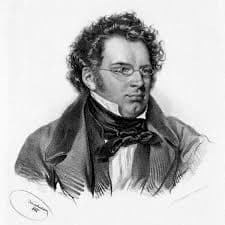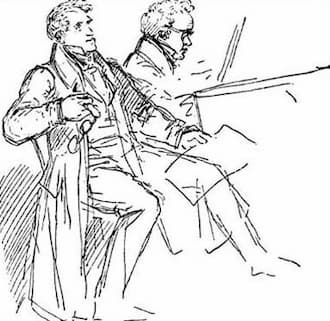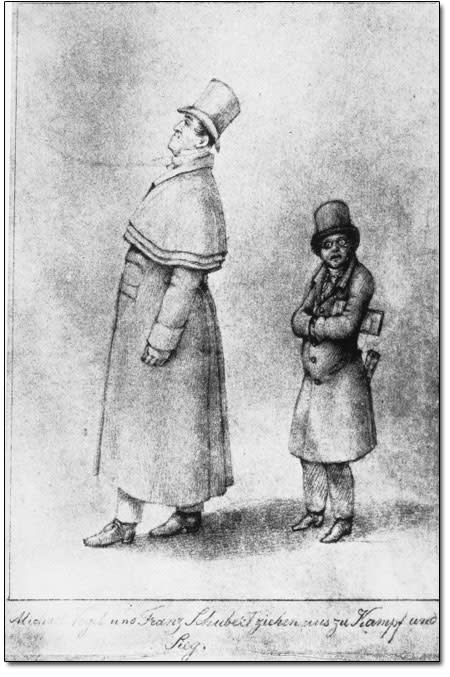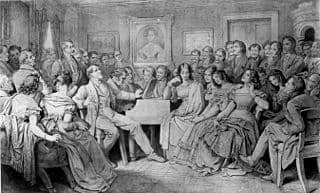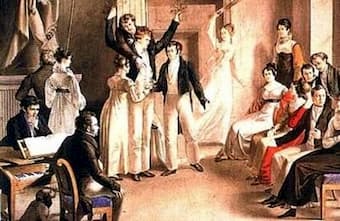
Schubertiade
Franz Schubert and his close-knit circle of artist and friends frequently gathered at the large apartment of Ignaz von Sonnleithner to hold their Schubertiades. These meeting had distinct intellectual, erotic and often political undercurrents. In the aftermath of the French Revolution and the Napoleonic Wars, Austrian police was highly suspicious of any gathering of students, youth, intellectuals and artists. Following one such gathering, Schubert and four of his friends were arrested on suspicion of revolutionary activities by the Austrian secret police. Schubert was severely reprimanded for “inveighing against officials with insulting and opprobrious language,” however his school friend Johann Senn (1795-1857) was imprisoned for fourteen months without charges. Senn, who was known under the pseudonym “Bombastus Bebederwa” was a talented poet and writer, and after his release he was permanently exiled from Vienna. Schubert never saw him again, but he continued to set his poems to music, including the famous “Schwanengesang.”
Schubert: Schwanengesang, D. 957 (Julian Prégardien)
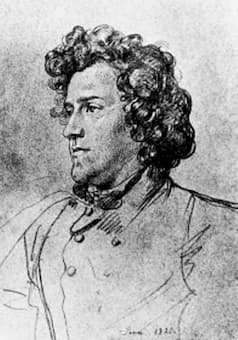
Johann Senn
Josef von Gahy (1793-1864) was a Viennese court official, a very good amateur pianist, and a close personal friend of Schubert. Gahy and Schubert frequently played compositions for piano four hands at the famous Schubertiade meeting, and Schubert appreciated Gahy’s sight-reading ability and considered him his favorite piano partner. Gahy remembers, “The hours which I spent in interaction with Schubert were among the most enjoyable of my life, and I cannot think of that time without being moved deeply. Not only did I learn many new things, but the pure playing, the free conception, the at times tender, at times fiery energetic interpretation of my little chubby friend granted me much joy, which was further augmented as, on such occasions, Schubert’s ‘Gemütlichkeit’ unfolded in its full glory and as he characterized the different compositions with humorous, at times also sarcastic remarks, but which were always apt.” In the 1860s Gahy expertly took on the task of reworking some of his late friend’s composition for piano duet.
Franz Schubert: Piano Trio No. 1 in B-Flat Major, Op. 99, D. 898 (arr. J. von Gahy) (Anthony Goldstone; Caroline Clemmow, piano)
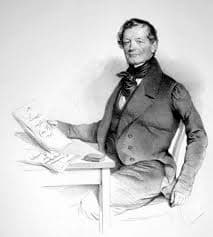
Anton Diabelli
The music publisher, editor and composer Anton Diabelli (1781–1858) is best known for penning the waltz on which Beethoven wrote his famous Diabelli Variations. However, Diabelli also ran a highly successful music publishing business in partnership with Pietro Cappi. The firm soon championed the works of Franz Schubert, recognizing the composer’s potential and publishing more than 40 opus numbers during Schubert’s lifetime. Diabelli continued to publish Schubert’s work until 1823 when an argument between Cappi and Schubert terminated their business. Following Schubert’s early death in 1828, Diabelli purchased a large portion of the composer’s musical estate from Ferdinand Schubert. Containing hundred of unpublished compositions, Diabelli was able to publish new Schubert works for more than 30 years after the composer’s death. And as you might know, Schubert also wrote a short variation on a Diabelli waltz!
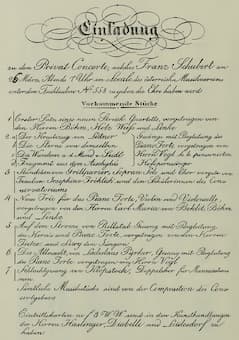
Schubert’s concert programme in 1828
On 26 March 1828, Franz Schubert gave his one and only public concert in his life. Held on the premises of the Austrian Music Society, the program presented a balance between his instrumental and vocal compositions. The vocal selections consist of mostly recent and uncontroversial works, setting texts by Friedrich Gottlieb Klopstock, for example.
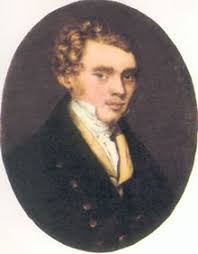
Karl Holz
On the instrumental side we find the first movement from a string quartet—possibly D 887—and the complete E-flat Trio D 929. Unfortunately we have no contemporary accounts of the concert, but we know from the program that Karl Holz (1798-1858), violinist and member of the Schuppanzigh Quartet participated in this concert. Holz had played in a number of premieres of Schubert’s works, but he is probably best known for arranging a performance of Beethoven’s C-sharp minor Quartet for Schubert on his deathbed.
For more of the best in classical music, sign up to our E-Newsletter

